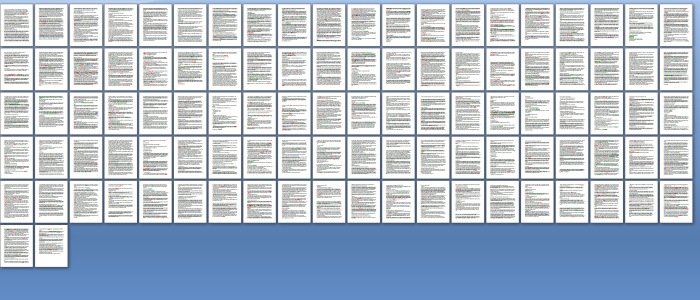To be completely honest here – I am more than a little chuffed with myself. One week out from NaNoWriMo (that’s National Novel Writing Month for the uninformed) and completely on a whim, I decided to participate in the challenge. That challenge is to write 50,000 words in the month of November. I am ecstatic to report that I succeeded in this challenge, and this post is to tell you exactly how I did it. My final tally was 50,314 words.
My greatest problem with writing for the longest time has been actually writing. Yes I’ve written a short story or two – but I’ve then fallen into the trap of editing them until oblivion. I think about writing all day and all night but I can’t actually make myself write. How the hell can I call myself a writer if I can’t do the most obvious part – the writing?
Having hoovered up every writing resource under the sun, from plotting to character development and everything in between, by far the most challenging part of writing is just sitting down, bum on seat, and making words appear on the screen. No Reddit posts, no blogs – just fiction!
So what was different this month? I don’t really know! But this is what I did:
- What was I going to write? I have been thinking about an idea for a novel for a long time now – at least 1-2 years. I’ve given this considerable thought, including the setting, characters and the basic plot. I’d written a few thousand words into the first chapter but that was about it. Going into NaNoWriMo I decided to write this novel and progress from start to finish – rather than writing just any old crap. I wrote a basic outline of the key points and there ended up being 14 of them. This took the story to around the halfway mark, but I figured if each of them had around 3-4000 words (which is what my average short stories tend to be) I would have enough – or at least by the time I’d written all 14 points, I’d have a better idea of where to go next.
- My philosophy: Ok this one sounds a little wanky but there’s some important things that I like to remind myself when setting out on such a massive task. Specifically – a quote and a concept.

A journey of a thousand miles begins with a single step – Lao Tzu
I found myself coming to this quote time and time again when studying Mandarin Chinese. In the beginning it seemed an insurmountable task to learn that particular language, and while it still seems so 7-8 years later, the only way to learn it is one step at a time. The same is true of writing a novel – a ridiculously massive undertaking when you consider it as a whole, but as soon as you write that first page, and then another, and another – suddenly you’re well on your way. It’s important not to let yourself lose sight of this idea or you’ll quickly watch your motivation to continue plummet.
My second inspiration comes from watching artists paint. Have you ever watched someone paint an oil painting? They don’t paint the perfect house then the perfect door, besides the perfect tree in the perfect garden – they slop down big slabs of colour to vaguely illustrate where these details will eventually be. Then they slowly build upon these slabs with basic detail, which is built up and up and up until it begins to resemble the finished subject. But then they take it so much further again. Watch this video as an example.
The basic image is built up and up – the detail layered in on top of the sketch.
Drafting a novel is exactly the same concept – your first draft while potentially horrible, is only the starting point. Each time it’s re-drafted the writing gets better and better, the characters grow and take on lives of their own. But without that first draft beneath it, unless you’re some kind of freakish word wizard, you’re not going to get there. And as a friend often says, “You can’t edit a blank page.”
- 1600 words per day target: With NaNo specifically, you need to write 1600 words per day (actually it’s like 1612). With this goal in mind and using the NaNoWrimo dashboard counter to collate them – I started to bleed onto the page.
- Story milestones: And this was the key for me– as I sat down to write I knew that however bad, I simply had to get to those story milestones I have previously written down – the 14 points of outline. The dialogue was terrible, the characters were flat and lacking their own voices, but I forced myself to keep writing until I reached those milestones. The first few thousand words were easier as I knew where I was going, but soon I was into brand new territory and having to make the story up as I went. Having a mini-goal at the end of every section was ridiculously helpful – that and knowing I could go back and fix those earlier words when I begin the redrafting process.
- Don’t get bogged down in detail: Anytime I reached a name of a place/character/concept that I couldn’t think of straight away, I put in a placeholder type comment along with a square bracket]. This would be easily located down the track and would prevent me from bringing up Google and starting to research something – however basic. Research is essential in a novel but has the distinct habit of getting in the way of actually writing.
- Ignore consistency (for now..): At several points I had realizations that certain events needed to be foreshadowed earlier, or certain characters needed to already be at a certain point of change and again would need earlier re-writing. Rather than going back and changing those things in this draft it’s important just to carry on. One character of mine picked up 20 years of age, another suddenly had abilities he didn’t have previously. I just wrote like that was the new norm, conscious that these too could be fixed later on.
- Find that right time to write: Writers often talk about finding the right time of the day to write and by god is this true. A friend of mine recommends getting up an hour earlier before work and well I’ll admit, I’m not that hardcore yet but I did realize during this process that there were times that were unbearably difficult to write. For me – I had to start during the day, the earlier the better, and finish at night. I would often start during my lunch break at work and get as many words down as possible and then finish when I got home from work or early evening after dinner. IF – and this happened a few times, if I got to 9pm or so and then started writing? Sweet Jesus that was difficult! By that time of night, after a long day of work and various other family related issues, I simply did NOT have the mental capacity to write new words. I would sit there looking at the keyboard and force myself to type, updating my word count every few minutes, 100 by 100 excruciating words until I got to 1600. By comparison, if I got 7-800 under my belt, knowing I only had another 6-7-800 to finish at night was considerably easier.
- Edit the last page and continue: Knowing I have a tendency to re-write indefinitely, I didn’t allow myself to re-read anything I had written previously other than the last page. I would then begin to re-write/edit this last page and continue on into the next section. Not only did I often pick up a lot more words from fleshing out this last part of the writing, but my mind would return to that place in the story and it was a lot easier to begin again. I found this particularly useful.
- Know what you’re writing next! I found a fantastic piece of writing advice along the way- actually a quote from Ernest Hemmingway:
Always stop for the day while you still know what will happen next
This was fantastic – even if I finished the night on a chapter but only a few sentences into the next one. It was important that I knew where the next one was going as I would think about it in that time before I started (often at work or when out and about).
- Pace yourself: And finally, this one applies specifically to NaNoWrimo – pace yourself! There are people out there who write a few hundred thousand words during the same time many of us struggle to hit a mere 50,000 and good on them – but the challenge is designed not as a ‘see how many words you can humanly squeeze out of your head’ but for people such as me who are having trouble writing. It’s about establishing a regular writing routine rather than just writing the word cats 50,000 times! If you feel you can blast the daily 1600 out of the water and finish halfway through the month then great – but don’t burn yourself out! There’s a reason why you cant claim the win until the 20th of the month – it’s designed to get you writing ALL month. It’s a mighty challenge, but make the most out of it.
And finally – here’s my NaNoWrimo baby below – damned if I am not proud of him/her! My plan now is to hang onto that momentum. I’ve had a few writing free days since finishing on Monday 28th November but now it’s time to get back on the horse and keep writing! I banged out 1800ish words yesterday but realistically, my daily goal will be around the 800-1000 mark. Whether I can hold onto that momentum going forward – well time will tell!

Did you participate in NaNo too? How did you go? Do you have any of your own advice to share?